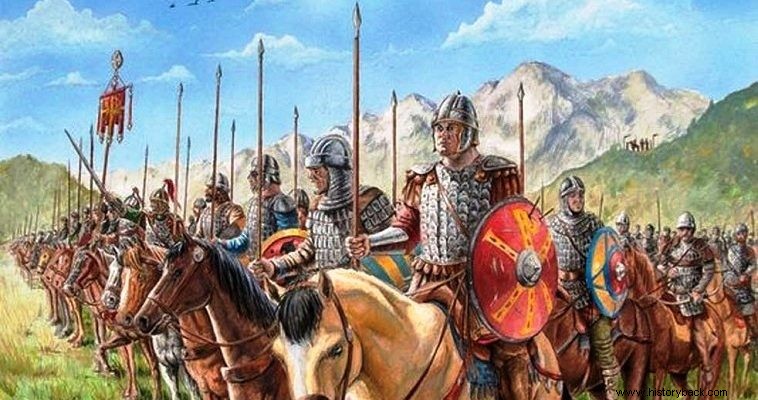
After the defeat of his forces at the Battle of Decimus, the Vandal king Gelimeros, at the head of his surviving men, moved south-west towards Mauritania. The morale of the army had fallen to such an extent that it did not even attempt to overthrow the few buccalarians (elite Byzantine horsemen) of Belisarius' general Ioannis, who were "besieging" the capital of Carthage. But by abandoning Carthage Gelimeros was as if renouncing the continuation of the war.
At the time when Gelimeros was gathering the remnants of the army on the plain of Voulis and begging the Moors to join him, Belisarius was entering Carthage victorious and with a trophy. But the war was not over, since a large part of the Vandilic Army remained undefeated on the plain of Voulis, together with its king and the worst was reinforced with 5,000 elite men under Gelimeros' brother Jazona.
Strengthened, Gelimeros decided to attempt to recapture his lost capital but failed. The next day, as soon as he had finished, the Vandals lined up outside their camp in the area of Trikamarus, 30 km west of Carthage, in front of a small river. Belisarius, on his part, seeing the Vandals arrayed, he also arrayed his army against them.
The Byzantine Army lined up in two battle lines. The first was made up exclusively of cavalry, deployed in an acrobolization arrangement, so as to cover the whole of the extended enemy front. Behind him were sent all the infantry and 500 buccalarians, under the command of Belisarius himself. Belisarius had about 8,000 men, compared to twice as many Vandals and thousands of Moors, but in the end they did not get involved in the battle.
Battle on the river and smart tactics
It was December 15, 533 AD. Suddenly Belisarius gave the signal to the cavalry leader John to attack the enemy center, with the aim of creating a bridgehead on the Vandal-controlled bank of the river. John engaged small forces and did not allow them to get hooked. As soon as they received a counterattack from the Vandals, the Byzantine horsemen retreated and crossed the river again towards the opposite bank. The Vandals, led by Jazona, pursued them to their own bank of the river. There they stopped and then returned to their seats singing victory paeans.
Belisarius then realized that the opponents intended to adopt a defensive posture, despite their numerical superiority. Thus he ordered John to launch continuous attacks against the enemy's center, but not to engage in massed combat, but to retreat when pressed and to intervene immediately afterwards. John, reinforced with all the buccalarians, followed the general's instructions to the letter. But each time his attacks were unleashed with more and more force and with more and more momentum. The Vandals receiving the arrows of the Byzantine cavalry tried to approach them to engage in individual combat with them. then the more heavily armed buccaneers intervened, who did not hesitate to engage with the Vandals.
Finally, strongly pressed, John again ordered a retreat. In a few minutes, however, the Byzantine cavalry attacked again. This time the buccaneers opened the attack, supported by the arrows of the cavalry, who followed in second echelon, and of the infantry who followed in third. Under the weight of the combined onslaught the vandal front began to show signs of inflection. Belisarius perceived this and ordered the whole army to attack the Vandals now. At that moment a buccalarian killed Jazona. At the sight of his dead brother Gelimeros fled.
The Vandals, without leadership and under pressure from the entire Byzantine Army, collapsed. The Moors also their allies, seeing the disintegration of their front, also fled. As for the Huns, who had hitherto taken no part in the battle, seeing Belisarius again victorious and fearing his wrath, they attacked with fury against the Vandals. The Vandals, demoralized, shut themselves up in their camp, mourning their 800 dead.
The Byzantines had lost only 50 men. The battle had ended with another proud victory for Belisarius. It was not because of losses that Belisarius had been victorious. The surviving Vandals, even without allies, outnumbered the Byzantines. It was their morale and will to resist that Belisarius had broken and that was the worst for them. In the meantime, Belisarius continued the attack with the aim of capturing the enemy camp. But the Vandals did not stop to defend it. Led by their king, they fled in disorder at the sight of the approaching Byzantine phalanxes. A few months later Glimeros was also captured.
